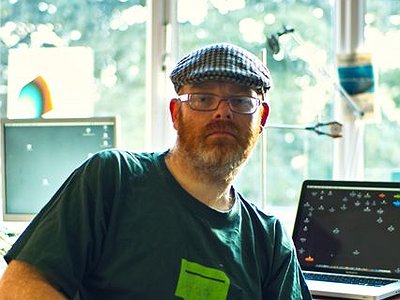Question and answer
In how much, do you feel, are creative decisions shaped by cultural differences - and in how much, vice versa, is the perception of sound influenced by cultural differences?
In terms of perception of sound I think there has been quite a large amount of research in this area. But I am not so familiar with it and will have to pass on that question. In terms of how creative decisions are shaped by cultural differences I want to refer to the development of two drum machines; in fact, probably the two most famous drum machines - the Linn LM1 and the Roland TR808. It's interesting that these were produced in the same year - 1980. The LM1 was available a few months before the 808.
It is interesting that the 808 was considered redundant and inferior on its releases. It is suggested that this was because the LM1 used samples of "real" drum sounds and its mode of event sequencing was "real-time" where the player could tap pads to record patterns. By contrast the 808 used synthetic models of drum sounds and its mode of event sequencing was a step time grid. The LM1, it was thought, was a more accurate representation of the thing it intended to copy.
But the point is, although both machines were intended to be copies of actual drums, actual drumming, and actual drummers, both proposed very different ideas about what this means. With some analysis I think it is possible to relate these differences to features of cultural characteristics present in North American and Japanese society; it shows how these systems are implied in the two drum machines. The drum machine, even though it might aim to be a copy of drums, drumming and the drummer is not only a copy. Cultural systems are implicit within the copy.
The relationship between music and other forms of art - painting, video art and cinema most importantly - has become increasingly important. How do you see this relationship yourself and in how far, do you feel, does music relate to other senses than hearing alone?
I think for the past 75 years or so, studies agree that perception is multimodal, i.e. we don't just hear sound. An encounter with sound therefore is understood with our entire cognitive apparatus. According to this view, music does not only "relate" to hearing or all of the senses, but to the entire cognitive system. For example, something that interests me in particular is the ways in which music reinforces certain ideas about time, and how our experience of time is linked to musical ideas. In the west we have a linear score that divides time in to past, present and future. In this system, time generally has a one directional, one dimensional flow at a more or less constant rate; and time is divided into units of equal and related duration. These features closely mirror how we in the west describe or understand time. So I guess in answer to your question, for me, music relates to how we understand things as opposed to what we hear.
There seem to be two fundamental tendencies in music today: On the one hand, a move towards complete virtualisation, where tracks and albums are merely released as digital files. And, on the other, an even closer union between music, artwork, packaging and physical presentation. Where do you stand between these poles?
I don't have a particular stance on this - some projects are made for digital release, others for vinyl, others for specific spaces. Personally I prefer to release recorded work on vinyl and to consider the sleeve as part of the work. I think this is mainly because as a young person I was an obsessive record collector. Also I prefer to listen to music on vinyl.
The role of an artist is always subject to change. What's your view on the (e.g. political/social/creative) tasks of artists today and how do you try to meet these goals in your work?
For me, making work is ideally a way of questioning something. I think when we challenge an aesthetic position we also necessarily challenge much more than that.
Music-sharing sites and -blogs as well as a flood of releases in general are presenting both listeners and artists with challenging questions. What's your view on the value of music today? In what way does the abundance of music change our perception of it?
I like that so many more people are able to make music and distribute this in some form. But, maybe because I'm from the record collecting generation/mind-set, I really miss the scarcity of some materials. I guess this is probably some form of pathology however. On the one hand I like being able to source information quickly online. But at the same time I love the mythology around secret or rare recordings etc. I would search record fares for specific releases I had heard rumours of. This for me was not only a way of finding music, but also of making contact with people. Before the internet, record shops, second hand book shops, jumble sales, charity shops etc. provided meeting places. The same people would crop up in these situations, some of which you might get to know. It was very much part of the alternative world of the early 1980s.
How, would you say, could non-mainstream forms of music reach wider audiences?
I'm not really sure. I can't think of any specific examples.
Usually, it is considered that it is the job of the artist to win over an audience. But listening is also an active, rather than just a passive process. How do you see the role of the listener in the musical communication process?
I don't see my job as winning over an audience. I'm deliberately not interested in entertaining an audience, even if they are entertained. For me curiosity is the best response and I do not think that this is a kind of winning over. I see my job as posing questions to the audience. In this sense I consider their role as entirely active. I don't really know what a passive listener would be like; I don't think one could exist.
Reaching audiences usually involves reaching out to the press and possibly working with a PR company. What's your perspective on the promo system? In which way do music journalism and PR companies change the way music is perceived by the public?
For me the product itself is a kind of PR. I don't see the product as a pure thing that is then put through this machine that degrades it. For me it's all part of the same machine - the music, the cover, the advert etc. it's part of the same system. So for me I try to consider each aspect of this.
Please recommend two artists to our readers which you feel deserve their attention.
I've chosen two producers, probably best known for their work in the early 1980's, Martin Rushent and Eric Radcliffe. Rushent produced a number of important works including Dare by the Human League; and I particularly like Radcliffe's work with Depeche Mode, Yazoo and Duet Emmo.






